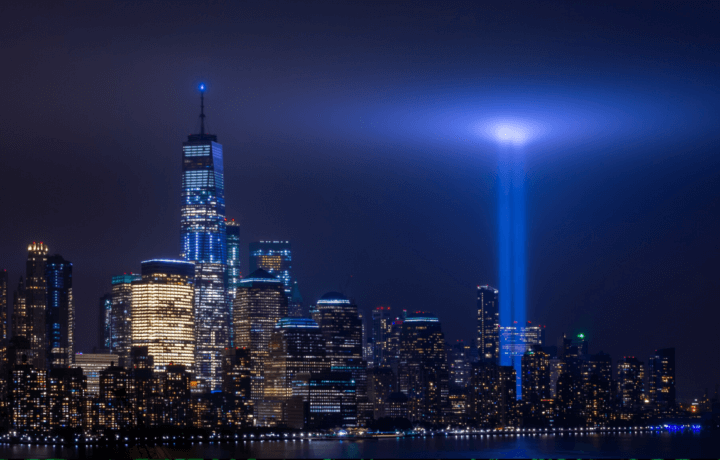When ClearanceJobs was collecting testimonials about what motivated professionals to join the national security space, one stood apart. Living so near to the events of 9/11 as a war-torn migrant’s daughter was key in driving her interest in national security.
EXPERIENCEs GROWING UP IN THE U.S.
She was barricaded in Russia on a layover on the way to BEY just before the attacks, with rumors of a plane going down overseas.
The day of the attack, she was sitting in her AP history class in a neighboring state to the World Trade Center.
Her parents are war-torn migrants from Lebanon during the outbreak of the late 1970s civil war. 9/11 felt very personal because it was almost as if the war followed them to the U.S., where they had spent decades trying to build a home in safety.
“I was lucky to be born and raised in a diverse NJ suburb and to have attended a very diverse public school. My story is a lot like Tula’s from that movie, “My Big Fat Greek Wedding” – pita bread lunches and a large family with very thick accents. But I was lucky, too, in that there was a good size Lebanese Maronite diaspora in the area, my own large extended family included, and so I never felt too out of place. We kept close, as a community of immigrants and first-generation Americans, through the Maronite church.”
PRE 9/11 – BARRICADED IN RUSSIA
“During the summer of 2001, my brother and I were performing at Disney World with the New Jersey Repertory Theatre and arriving/leaving the Disney performance was no problem. We left Florida early to catch a flight home in New Jersey so we could pack for a planned trip overseas. We went from Newark, NJ to Moscow to Beirut (BEY), but started to run into trouble when we had scheduled a long layover to be able to see the city. We had transit and visitor visas in order. But when we arrived in Moscow, we were shuttled to the Novotel where we had reservations but were not allowed out of our room. A guard stood watch on the floor, where we were staying with all the other Arabs who were scheduled to get on the flight to Beirut. The Russian officials claimed to not speak English in the Moscow airport, but I heard them speak in English behind closed doors. I was just 15 and did not understand why we were not allowed out of our rooms, not even to eat. It was the first time I was really scared of discrimination. I did not know what I did not know, but it made more sense after I was told about 9/11.”
9/11 ATTACKS
“On 9/11, I was in my AP history class, when the teacher was informed there was an attack. I had friends whose parents were working in New York City, specifically in the World Trade Center. Friends cried. I was pulled out of school soon after the announcement, just so I would not be targeted. My mom sat my brothers and I down, trying to explain the situation. She was scared. They came to build a home in safety in America, but being in New Jersey, it just hit too close to home. It felt like the war had followed them here to America, and just when they were feeling settled, it unsettled them. They warned us to be careful, in case we were targeted, but we were lucky that we had grown up in the area and were already familiar in our schools, community, and the Catholic church. The discrimination was more apparent during travel from that year forward. In Heathrow, we always get pulled aside for questioning on our way to BEY and there are always two lines – one for fair haired, fair skinned, and one for us – dark hair, dark skinned, White/non-Arab and Arab.”
THE WAR ON TERROR
“I closely followed the events that followed the attacks the next few years with the war in the middle east. I also studied international affairs at George Washington University. I have conflicting thoughts on the war on terror, as I’ve always been straddling two cultures and two countries. But I was born and raised in America, and live here, so I absolutely support our national security first. My real critical feedback has always been the rhetoric – I find it subverts our domestic national security needs. We need to be laser focused in who the terrorists are and not overgeneralize. This will come with a greater understanding of the Middle East as a whole.”
ENTERING THE NATIONAL SECURITY WORKFORCE
“After studying at George Washington, I received my first job as an L3 contractor at the Department of Homeland Security. It was the best introduction to the space. I was cleared there, but not without hurdles as a dual national with a lot of extended family abroad. It took me longer than most to get cleared, almost 2.5 years, and they actually lost my paperwork the first time. As an acting federal agent at the U.S. DHS Student and Exchange Visitor Program (SEVP), I went on to be the SEVP training lead and subject matter expert, and it was an honor to be a part of establishing this program. It fell directly in line with my national security interests and the reason I came to the space.”
Different Pasts Leads to a Stronger Future
She has always felt a sense of obligation to this space but has run into obstacles and issues working in national security, both as a woman and having a diverse cultural background. Pursuing a national security career often requires tenacity – through the application and security clearance review process, even more so for individuals who are first or second generation Americans. But for this professional, being patient to the process has led to a career where her diversity helps strengthen national security.




